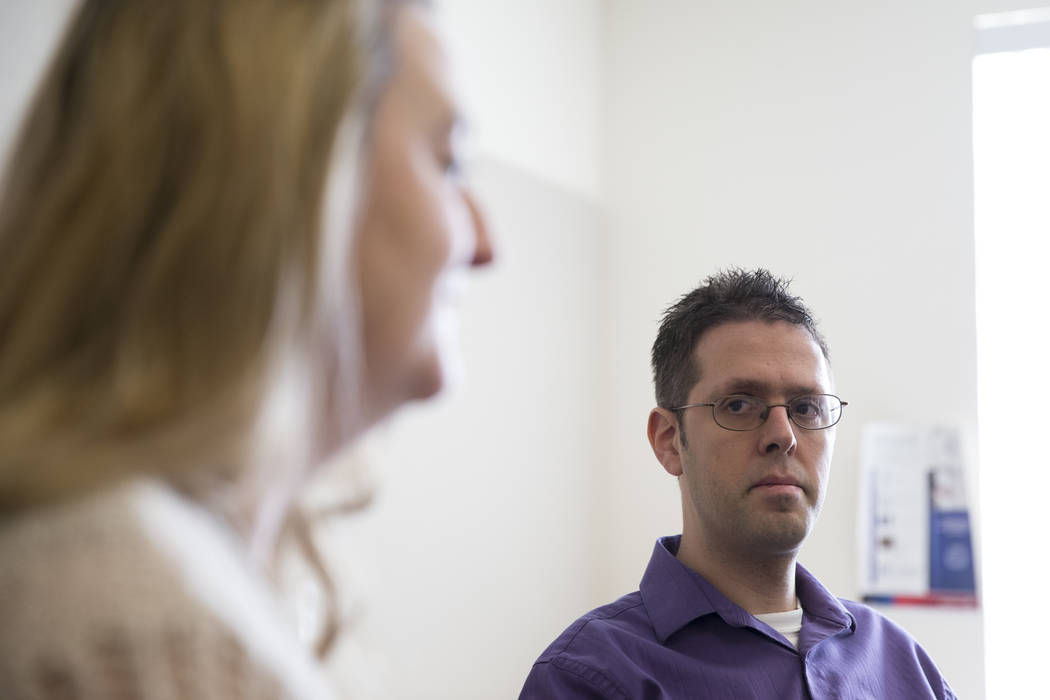Northwest valley man with autism excels in loan-processing role
Thomas Muench ranks as a top loan processor nationally at Bank of America. He struggles with some other elements of daily life.
The 39-year-old northwest valley resident was diagnosed with autism when he was 2. Now he’s marking his 15th year working for the bank.
“I try not to let (autism) take advantage of me,” he said.
Bank of America employees in jobs like Muench’s process an average of 60 loans a day; Muench processes about 100 a day, manager and mentor Mary Ellen Manchester said. He has received several quarterly awards for being the company’s top performer, she added.
“Thomas is phenomenal at speed,” Manchester said. “You probably couldn’t keep up with his screens if you watched him.”
Muench is from Brooklyn, New York, and moved to Las Vegas with his parents when he was 19, said his mother, Pauline. He was hired to do data entry for Bank of America through a temp agency.
When management noticed Muench was picking up the skills quickly, he was asked to stay. Patricia Morrow, a senior loan processor, trained him.
“He was very eager to learn,” she said. “He just watched me for a few days and a few days later, he was working on his own. … He has the ability to shut out the outside world and just focus.”
Muench worked in data entry for five years before being promoted to the loan-processing department.
Pauline, 76, said he has made a lot of progress over the years. She said she realized he had a condition shortly after he was born, when he stopped making eye contact.
“I would put him by the window and all of our neighbors would be waving at him, but he wasn’t paying attention,” she said. “He was looking at the objects. He was looking at the cars, at the trees … in my gut I knew something was wrong.”
After taking Muench to a pediatrician and a neurologist, she learned he had infantile autism.
“I just cried all the time,” she said. “I wasn’t anything to him. His psychiatrist even said Tommy is treating you like an object.”
Muench said his first word when he was about 2 1/2: egg. Pauline recalls thinking that if he could say that, he could say anything. His next word was juice, and by age 4, he was writing the alphabet.
He attended therapy until he was 8 and was put in the mainstream school system by the time he was in middle school, Pauline said. His teachers recommended he attend Mark Twain Intermedia School for the Gifted and Talented; then he attended Edward R. Murrow High School in New York. His best subject was math, Pauline said. He later completed his associate’s degree in computer science at the College of Southern Nevada, she said, receiving high honors.
Doctors in Brooklyn said Muench would eventually get a job “stuffing envelopes,” Pauline said, adding she’s pleased he has proved them wrong.
“I’m just very proud of him,” she said. “He’s just an unbelievable special man. I really thank God every day for him.”
Muench wakes at 5 a.m. and takes two buses to work, he said. Pauline said he doesn’t like to drive, so she drives him to appointments and other places. He lives with his parents.
Although Muench was not social when he started working at the bank, he has since opened up, Morrow said. Manchester and Morrow said they forget Muench is autistic.
Muench spends a lot of time on the computer, listens to music, works on crossword puzzles and watches game shows, Pauline said. He’s also known to be a trivia wizard, plays dominoes with his parents every night and goes to bingo with his mother on weekends, she said.
He also donates time and money to nonprofit organizations including Autism Speaks and Brain Balance and is the grand chancellor of his fraternal organization the Knights of Pythias, which he joined about 10 years ago. He said he has volunteered with the Special Olympics and Opportunity Village through the bank.
“He himself is a role model for his peers,” Manchester said.
Contact Kailyn Brown at kbrown@viewnews.com or 702-387-5233. Follow @kailynhype on Twitter.
About autism
People with autism face difficulties communcating and in social situations, and tend to repeat behaviors. Severity of the condition varies widely.
Source: autismspeaks.org























